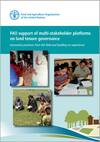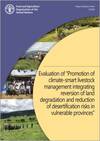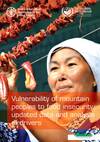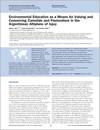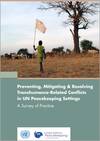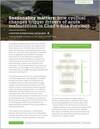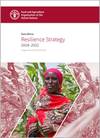As part of the efforts to find sustainable solutions to complex land tenure issues, multi-stakeholder platforms (MSPs) create an inclusive forum where actors can discuss problems and propose solutions to improve governance of tenure and provide better access to natural resources. This publication highlights how MSPs at regional, national and local level demonstrate forward thinking, including innovative practices and approaches to respond to the above mentioned social challenges, for the benefit of all.
Year of publication: 2020Organization: Food and Agriculture Organization of the United Nations (FAO)
Topic: Land
Language: English
Type of document: Technical
Geographical coverage: Global
n Ecuador, the livestock sector is essential for food security. It is also an important source of employment and income in provinces with a large presence of small and medium-scale farmers. From May 2020 to October 2020, FAO implemented the project to “reduce soil degradation, and mitigate greenhouse gas (GHG) emissions in the livestock sector of Ecuador”. The project was implemented seven provinces, distributed in three geographic regions of the country (coastal Ecuador, the Andes and Amazon). The project had an impact on public policies, with the incorporation of climate-smart livestock farming as one of the lines of action for the agricultural sector. In terms of technical aspects, the preparation of online tools to monitor GHG emissions and to calculate climate risk and the adaptation capacity of the sector is noteworthy. One void shown in the project, throughout the consultation process with interested parties, was the lack of connections to the market and the private sector. This was not contemplated in the project design and arose as a recurring issue during the implementation
Year of publication: 2020Organization: Food and Agriculture Organization of the United Nations (FAO)
Topic: Climate change, Food security, Participation
Language: English
Type of document: Technical
Geographical coverage: Latin America
This study, the third of its type published by the Food and Agriculture Organization of the United Nations (FAO), adds further evidence that in mountain regions of developing countries, food insecurity, social isolation, environmental degradation, exposure to the risk of disasters and to the impacts of climate change, and limited access to basic services, especially in rural areas, are still prevalent and, under some circumstances, increasing. It also shows the technical challenges for producing more comprehensive and representative assessments based on scientific data, and providing a deeper understanding of the underlying factors of vulnerability of mountain people.
Year of publication: 2020Organization: Food and Agriculture Organization of the United Nations (FAO), United Nations Convention to Combat Desertification
Topic: Food security, Resilience
Language: English
Type of document: Technical
Geographical coverage: Global
Andean pastoralism, like other pastoral systems around the world, is under stress due to climate change, land tenure regimes, pressures to become sedentary, difficulties in interacting with market-based economies, isolation, and youth emigration. This paper presents the results of 4 environmental education interventions focusing on mountain environments, their biodiversity, environmental calendars, and llama caravans.
Year of publication: 2020Organization: Individual authors
Topic: Education, Environmental services, Participation, Social services
Language: English
Type of document: Scientific
Geographical coverage: Latin America
Climate change adaptation literature on pastoralists often embraces a systems approach that uses aggregate analysis, giving a false assumption of community homogeneity. Analyzing key adaptation practices among Maasai (agro-) pastoralists’ of Laikipia County, we outline how wealth, age and gender differentiate actors’ adaptation pathways. We argue that adaptation pathways are political processes highly negotiated by these elements of social differentiation and that individual actors adaptation opportunities are substantially shaped by their social positions.
Year of publication: 2020Organization: Individual authors
Topic: Conflict
Language: English
Type of document: Technical
Geographical coverage: Eastern Africa
This survey of practice, produced by the Civil Affairs Team in DPET/DPO, is based on a review of current practices, challenges and opportunities in peacekeeping settings while also drawing from external expertise and resources that help illustrate the complex web of factors that undermine relations between herders and farmers in the African continent. The survey captures practices from Mali, Central African Republic, Darfur and Abyei, in Sudan, South Sudan and Eastern Democratic Republic of Congo where UN peacekeepers support the prevention and/or mitigation of conflicts between farmer and herder communities, especially during the time of transhumance, working with a wide range of relevant stakeholders like national and local authorities; traditional and community leaders; civil society actors, and other international partners. While highlighting what is already done by UN peacekeepers to address transhumance-related conflicts, as well as underscoring the challenges they face, the survey of practice also provides concrete recommendations to further improve the impact of these intervention to support sustainable solutions.
Year of publication: 2020Organization: Individual authors
Topic: Conflict
Language: English
Type of document: Technical
Geographical coverage: West Africa, Central Africa
This brief summarizes the seasonal patterns of acute malnutrition and its key drivers in the Goz Beida Region of Chad. It reveals a nuanced and complex seasonal pattern of wasting characterized by two different sized peaks with likely different drivers; a primary and larger peak at the start of the rains and a secondary smaller peak prior to the harvest. As well as exploring the basic, immediate, and underlying drivers of acute malnutrition, this briefing paper offers recommendations for programming and evaluation that are grounded in a seasonal perspective.
Year of publication: 2020Organization: Feinstein International Center, Individual authors
Topic: Food security
Language: English
Type of document: Technical
Geographical coverage: Central Africa
The FAO Programme of Work 2020–2021 is the second module of the Eastern Africa Resilience Strategy 2018–2022, and the two should therefore be read in conjunction. The main features of the new Programme of Work were presented and discussed with resource partners in Nairobi in December 2019. While the strategic objective, outcomes and outputs remain unchanged, the new Programme of Work’s activities reflect global evolutions in the humanitarian-development ecosystem, recent and emerging regional threats and risks, particularly Desert Locust and COVID-19, and lessons learned during the past two years.
Year of publication: 2020Organization: Food and Agriculture Organization of the United Nations (FAO)
Topic: Food security, Resilience
Language: English
Type of document: Technical
Geographical coverage: Eastern Africa


